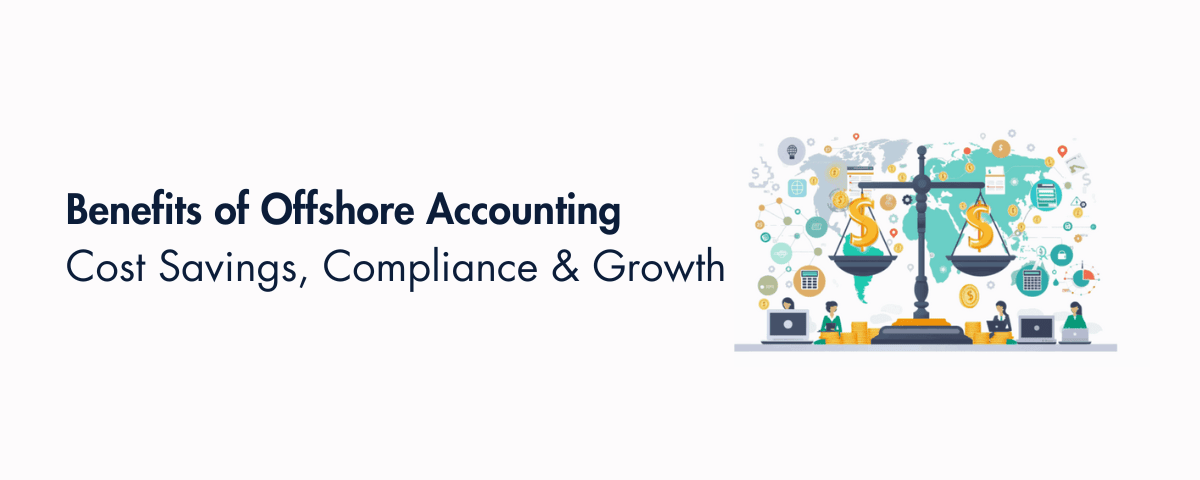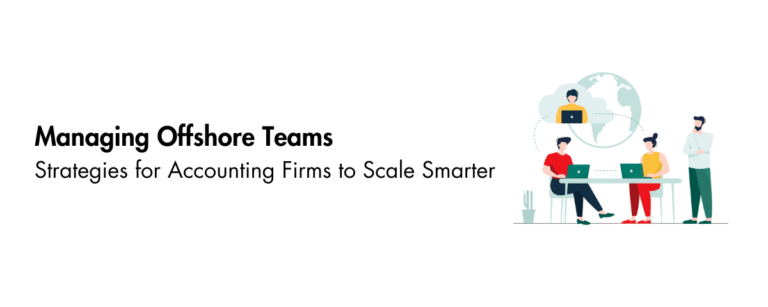The next month, our reconciliations were waiting when I woke up, AR follow ups were already in progress, and our onshore seniors finally had time to review and advise clients. That is the promise of offshore accounting when it is done right.
A quick note for context. Accountably partners with CPA firms, EAs, and accounting practices to provide offshore staffing and white label back office support. Teams work inside your processes, align with U.S. compliance standards, IRS guidance, and GAAP, so you can expand capacity without adding risk. We will keep the rest of this guide vendor neutral and practical, and only mention Accountably where it adds clarity.
Table of Contents
- Key Takeaways
- What is Offshore Accounting?
- Significant Cost Savings
- Access to Specialized Expertise
- Scalability and Flexibility
- Enhanced Efficiency and Productivity
- Real Time Financial Insights
- 24/7 Coverage Through Global Time Zones
- Strengthening Cash Flow and Financial Management
- Technology Enablement and Process Standardization
- Choosing the Right Offshore Accounting Partner
- FAQs
- Implementation Blueprint
- Common Pitfalls to Avoid
- Conclusion
Key Takeaways
- You can realize 40 to 60 percent per role labor savings, with some firms seeing higher total reductions once you factor in overhead like seats, devices, and licenses. Use the savings to fund automation and advisory capacity.
- Tap deeper talent pools trained in US GAAP and IFRS, especially in India and the Philippines, which also offer strong English proficiency. Manila ranks in the high band in the EF English Proficiency Index, a useful signal for client facing work. (en.wikipedia.org)
- Build elastic capacity for tax season and new service lines. A simple follow the sun handoff can cut month end turnaround to 24 to 48 hours while keeping quality controls intact.
- Improve cash flow with disciplined AR and AP, daily reconciliations, and clear SLAs. IRS resources for security planning and Written Information Security Plans are current as of July and September 2025.
- Standardize SOPs, integrate tools, and track work in one project platform. With the right onboarding plan and QA, many firms report measurable productivity gains.
What is Offshore Accounting?
Offshore accounting means you assign routine finance work, for example bookkeeping, reconciliations, payroll support, tax prep, AP, AR, and reporting, to qualified professionals in another country while you retain oversight and decision rights. You still own the close, the client relationship, and the outcomes.
Offshore accounting shifts repeatable work to specialists, and you keep control of policy, approvals, and final sign off.
Why this works now:
- Global talent, especially in India and the Philippines, brings US GAAP and IFRS training, plus strong English for documentation and client interaction. Manila’s EF EPI score sits in the high proficiency band, which helps with real time collaboration. (en.wikipedia.org)
- Time zones turn nights into output. You send tasks end of day, you review deliverables first thing.
- Security frameworks and IRS guidance give you a clear playbook for data protection, including Publication 4557 and the Security Summit resources, both updated in 2025.
Risk management is non negotiable. Put written SOPs in place, enforce two factor authentication, encrypt files in transit and at rest, and document handoffs. IRS publications for tax and accounting practices outline safeguards and WISP steps you can adapt directly to your firm.
Significant Cost Savings
You can reduce labor spend by 30 to 75 percent, commonly 40 to 60 percent per role, then stack additional savings by trimming overhead. The most reliable gains come from transactional work you can define, measure, and QA quickly, for example bank recs, AP, AR, and cleanup projects. Savings are only half the story though. The real win is where you redeploy that cash, for example automating reconciliations, upgrading your reporting stack, or adding a senior tax planner.
Lower Labor Costs
- Start with roles that have tight SOPs and high repetition. Expect meaningful per role savings as you scale.
- Hire in hubs with strong accounting education and English skills. India has one of the world’s largest accounting bodies with hundreds of thousands of members, and the Philippines shows high English proficiency, which eases cross border collaboration. (ai.icai.org)
- Keep quality high with structured reviews, written acceptance criteria, and a short overlap window for live questions.
Reduced Overhead Expenses
Lower headcount onshore means fewer seats, machines, and licenses. Vendors that include secure networks and IT support further shrink your fixed spend. That pay as you grow model protects utilization during quiet months and peak season spikes.
| Cost Driver | Offshore Impact |
| Facilities and IT | Fewer seats and devices, shared vendor infrastructure |
| Talent Ops | Lower training and recruiting costs, faster onboarding |
| Seasonal Demand | Variable capacity, less idle time between peaks |
Reinvested Savings Gains
Turn savings into capability.
- Upgrade your cloud accounting stack for bank feeds, rules, and automated matching.
- Fund client acquisition in profitable verticals and advisory services.
- Build structured training for your seniors so more hours shift to reviews and planning.
- Pilot analytics for pricing, cash forecasting, and compliance monitoring.
A final word on compliance. If you handle tax, align your controls with IRS guidance, including the Security Summit resources and Publications 4557, 5293, and 5708 for WISP planning. These are current through mid 2025 and are practical checklists you can implement. (irs.gov)
Access to Specialized Expertise
You gain a deeper bench, often with certifications and niche skills that are scarce or expensive locally. Typical specialties include US GAAP and IFRS application, revenue recognition for software, inventory and cost accounting, consolidation support, state and local tax prep, transfer pricing documentation, and international filings.
| Capability | Strategic Impact |
| US GAAP and IFRS mastery | Fewer misstatements, cleaner audits, faster closes |
| International tax support | Confident cross border filings and structures |
| Transfer pricing prep | Defensible files and audit readiness |
| Automation skills | Shorter close and higher analytic coverage |
Why supply is strong:
- India’s accounting profession is the largest in the world when you include members and students of ICAI, which keeps a steady pipeline of qualified talent. Regional councils report hundreds of thousands of members, which translates to reliable hiring pools for firms. (nirc.icai.org)
- The Philippines offers high English proficiency and an experienced BPO workforce, which helps with documentation, client emails, and ticketing. Manila’s “high proficiency” ranking supports this. (en.wikipedia.org)
Practical tip. Ask candidates to walk through a real file, for example a 606 revenue schedule or a multi entity consolidation. You will spot gaps faster than with theory questions.
Scalability and Flexibility
Demand rarely cooperates with headcount. Offshore accounting gives you elastic capacity that expands for tax deadlines and compresses when things quiet down, without layoffs. You can right size teams for cleanup, routine month end, and busy season, then pause or pivot as needs change.
- Add staff quickly from larger talent pools, then set a 2 to 4 hour overlap to keep questions moving.
- Convert fixed costs into variable. Pay only for the roles and hours you need.
- Use short sprints to clear backlogs, for example a 60 day cleanup with daily output targets.
Enhanced Efficiency and Productivity
Follow the sun execution turns idle hours into progress. Your U.S. team hands off at close of business, offshore teams reconcile banks, prepare AP runs, and post journal entries while you sleep. You review the next morning, resolve exceptions, and move on.
What this looks like in practice:
- Standardized checklists for close tasks, for example cash, AR, AP, fixed assets, revenue, and payroll.
- Clear definitions of done, with sample outputs for each task.
- Named reviewers, due dates, and turnaround SLAs.
- A short overlap window to answer questions live and reduce back and forth.
With the right cadence, month end fire drills fade, error rates drop, and close cycles tighten. Onshore seniors shift from data entry to reviews and advisory, which raises the value of every hour they work.
Real Time Financial Insights
Even when your office goes quiet, your ledgers do not. Offshore teams can post transactions, reconcile banks, and refresh dashboards overnight so you start the day with current numbers.
- Near real time dashboards with exception alerts.
- Daily reconciled bank statements for cash clarity.
- Fast variance analyses within 24 to 48 hours of month end, which speeds decisions.
- Continuous KPI tracking to flag overdue receivables and margin erosion early.
Security stays front and center. If you handle taxpayer data, follow the IRS playbook. Publication 4557 and the “Security Six” guidance call for multi factor authentication, encryption, backups, and VPNs, plus a written plan for detection and response. These resources were reviewed by the IRS in 2025, which makes them the right baseline for firm policies today. (irs.gov)
24/7 Coverage Through Global Time Zones
A well run handoff turns time zones into an advantage. You can close the books in one to two days, keep AP and AR moving without overtime, and remove late night heroics from your team’s calendar.
Follow The Sun Workflows
- Define what ships overnight. Good candidates include bank recs, AR cash application, AP coding, expense audits, and prepaids.
- Lock in a handoff window. A 2 to 4 hour overlap is usually enough to validate inputs and clarify edge cases.
- Document SOPs and quality checks. Use examples, not just steps, so reviewers know what good looks like.
Benefits you will feel quickly:
- Faster turnaround on daily close tasks, which means exceptions surface sooner.
- Consistent throughput during tax season without pushing your onshore team into late nights.
- Clear accountability with SLAs and QA sign offs.
Faster Turnaround Times
With continuous production, cycle times shrink. Many firms see close to final packages a full day earlier, which means partners review sooner and clients act sooner. During tax season, you can scale teams to process more returns on predictable timelines and keep turnaround promises.
Practical guardrails:
- Use a shared tracker that shows ownership, status, due dates, and blockers.
- Keep a living issues log so repeat questions turn into updated SOPs.
- Pair a senior reviewer with each offshore pod for the first 30 to 60 days, then relax as quality stabilizes.
Strengthening Cash Flow and Financial Management
Cash improves when billing is timely, collections are steady, and payables are disciplined. Offshore teams can push this forward every single day.
- Dedicated AR support to invoice on schedule, chase delinquencies, and reduce DSO.
- AP discipline to avoid late fees and capture early pay discounts.
- Weekly cash forecasts that use fresh books and bank recs.
- GAAP informed variance reviews that highlight margin and expense trends.
Result, fewer surprises and faster corrective action. If your firm touches taxpayer data in any of these workflows, bake in IRS security steps from day one and document your Written Information Security Plan. The Security Summit’s 2025 guidance and Publication 5708 are straightforward starting points. (irs.gov)
Technology Enablement and Process Standardization
Technology, paired with clear processes, turns offshore accounting into a force multiplier.
- Cloud accounting platforms with bank rules and import automations cut manual entry by large margins.
- 30, 60, 90 day onboarding plans get new team members productive quickly.
- API integrations connect accounting, payroll, CRM, and banks, which reduces reconciliation errors.
- A project platform creates one source of truth for tasks, due dates, and SLAs.
Security by design:
- Enforce multi factor authentication, role based access, and encryption for file transfers.
- Schedule vulnerability scans and maintain remediation logs.
- Align with a known framework, for example SOC 2 Trust Services Criteria, which focus on security, availability, processing integrity, confidentiality, and privacy.
Choosing the Right Offshore Accounting Partner
Treat selection like a regulated procurement. Verify technical depth, test controls, and prove outcomes before you commit.
Vetting Expertise and Standards
- Confirm US GAAP and IFRS experience. Ask for sample workpapers and redacted reports.
- Check certifications, for example CPA and ACCA, and tool fluency across your stack.
- Validate outcomes with references that cite cost reduction, faster closes, or expanded coverage.
- Run a paid pilot with SLAs and KPIs so you see the real fit.
A note on SOC 2. SOC 2 is an AICPA attestation framework that evaluates controls against the Trust Services Criteria. Type II covers operating effectiveness over a period, which gives you more confidence than a point in time check. If a provider claims SOC 2, ask for the most recent Type II report.
Security and Compliance Checks
Security is a gate, not a checkbox.
- Require multi factor authentication, role based access, and encryption in transit and at rest.
- Ask for recent independent assessments and evidence of remediation.
- For tax data, align your safeguards and Written Information Security Plan to IRS guidance, including Publications 4557, 5293, and 5708, and the Security Summit updates reviewed in 2025. (irs.gov)
- Contract for confidentiality, breach notification timelines, and right to audit.
Communication and Time Zone Fit
Communication windows keep productivity high.
- Aim for at least a 2 to 4 hour overlap for live questions.
- Use shared calendars, daily stand ups, and weekly reviews.
- Set response time SLAs and escalation paths.
Where Accountably fits. If you want a partner that already aligns with U.S. compliance standards, IRS guidance, and GAAP, Accountably’s offshore teams integrate with your process, handle white label back office work, and respect your client relationships. We bring the follow the sun model, defined SOPs, and security practices to help you scale without adding risk. We will keep the rest of this article neutral so you can apply it with any qualified provider.
FAQs
What are the benefits of offshore accounting for firms like mine?
You can lower costs, expand capacity for busy seasons, and get work back while you sleep. With clear SOPs and security controls, you tighten close cycles, improve cash flow discipline, and free onshore staff for reviews and advisory. Keep ownership of policy and approvals while your offshore team executes.
Is offshore accounting secure enough for taxpayer data?
Yes, if you implement the right safeguards and verify them. Use multi factor authentication, encryption, role based access, and a Written Information Security Plan. Align your controls to IRS Publication 4557 and the 2025 Security Summit resources, and ask vendors for recent independent assessments.
How fast can we realistically close the books with follow the sun?
With a clean handoff and documented checklists, many firms reduce turnaround to about 24 to 48 hours for month end packages. The key is a short overlap window, clear definitions of done, and a named reviewer who unblocks questions quickly.
Where do the best offshore accounting talent pools come from?
India and the Philippines are consistent sources. India’s accounting body supports a very large community of members and students, and the Philippines shows high English proficiency, which helps for documentation and client communication. Evaluate individual candidates on live files, not just resumes. (nirc.icai.org)
Implementation Blueprint
Use this practical sequence to launch with confidence.
0 to 30 Days, Set the Foundation
- Pick one or two processes, for example bank recs and AP.
- Write SOPs with screenshots, samples, and definitions of done.
- Set access with MFA, least privilege, and a secure file exchange.
- Create a WISP outline using IRS Publication 5708 and 4557 as your templates.
- Run a small pilot, for example 10 client files, and track cycle time, defects, and rework.
31 to 60 Days, Stabilize and Scale
- Add a second pod or role as quality stabilizes.
- Move daily AR and AP to offshore with exception handling rules.
- Build a living issues log, then roll fixes into SOPs.
- Tighten handoffs with a 2 to 4 hour overlap and named reviewers.
61 to 90 Days, Optimize and Measure
- Automate imports and matching where possible.
- Introduce variance analysis and management reporting.
- Publish a monthly scorecard, for example SLA attainment, cycle times, first pass yield, and DSO movement.
- Schedule quarterly security reviews and update your WISP.
Common Pitfalls to Avoid
- Starting with vague SOPs, which creates rework. Write, test, and refine before scaling.
- Overlooking security. Do MFA, encryption, role based access, and a WISP from day one. Use IRS checklists to keep it current.
- Hiring for resumes only. Always run a paid test file.
- Skipping a named reviewer. Without one, decisions stall and quality slips.
Conclusion
When you put offshore accounting on a solid footing, the benefits stack quickly, lower costs, better utilization, faster closes, and clearer cash flow. Add disciplined security, a written plan, and SOC 2 aligned controls, and you will scale with confidence. If you want a partner that already works to U.S. compliance, IRS guidance, and GAAP, Accountably can help you stand up a follow the sun model, then expand only when the data proves it.






